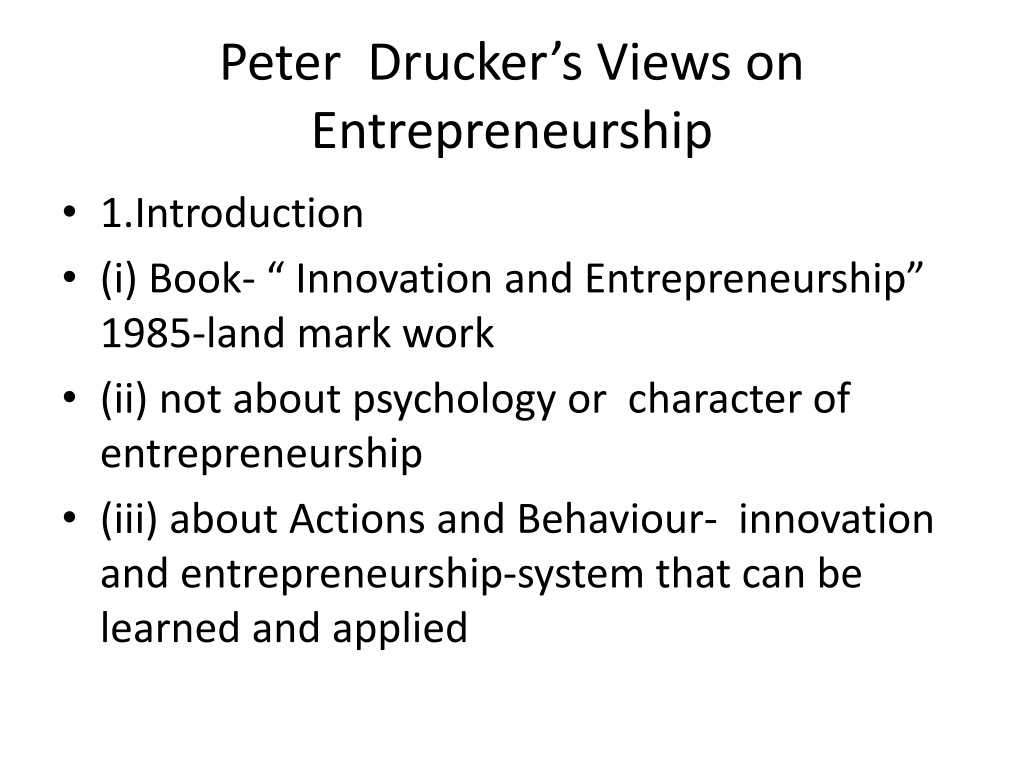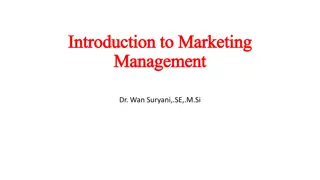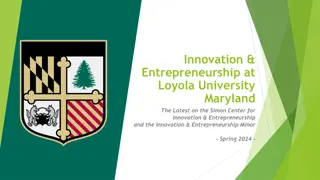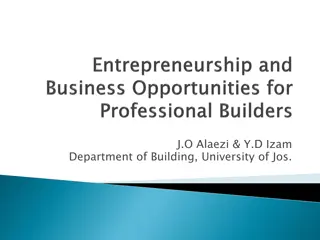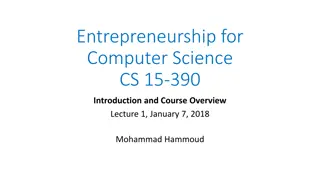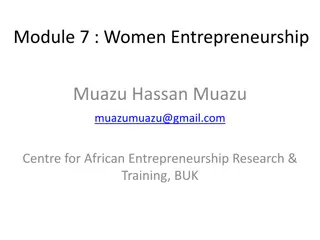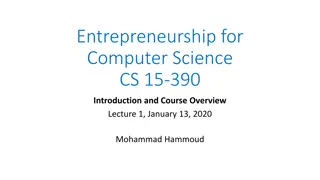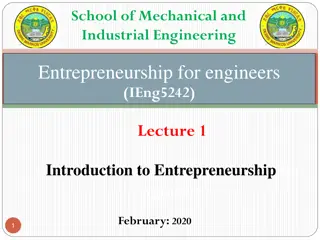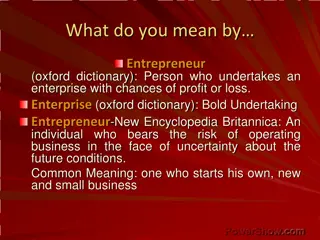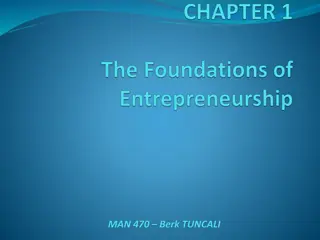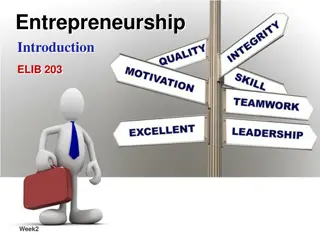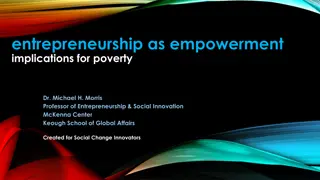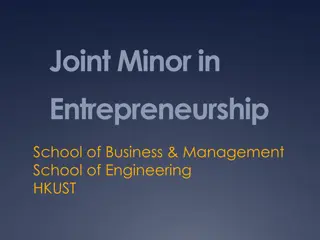Peter Drucker's Views on Entrepreneurship: Insights and Perspectives
Peter Drucker, in his seminal work "Innovation and Entrepreneurship," emphasizes that entrepreneurship can be learned and applied through specific actions and behaviors. He debunks the myth of entrepreneurship being solely about risk-taking and highlights the importance of disciplined work and identifying opportunities. Drucker's views on innovation stress the creation of social value and leveraging unexpected changes in society for success.
Download Presentation

Please find below an Image/Link to download the presentation.
The content on the website is provided AS IS for your information and personal use only. It may not be sold, licensed, or shared on other websites without obtaining consent from the author. Download presentation by click this link. If you encounter any issues during the download, it is possible that the publisher has removed the file from their server.
E N D
Presentation Transcript
Peter Druckers Views on Entrepreneurship 1.Introduction (i) Book- Innovation and Entrepreneurship 1985-land mark work (ii) not about psychology or character of entrepreneurship (iii) about Actions and Behaviour- innovation and entrepreneurship-system that can be learned and applied
Cont.. (v)development is due to entrepreneurial management force of entrepreneur (vi) defined as a discipline- which can be learned (vii) extends to all types of organisations (viii) not a magic , mysterious and nothing to do with genes
2.Risk-myth (i) Entrepreneurship is risky when so called entrepreneur violates elementary and well known rules (ii)Not risky when it is a. systematic, b. managed and c. purposeful (iii)Embracing change and trying out different things is actually best way to invest resources instead of just doing the same thing better
3.Entrepreneurship is a work (i) it is not natural and not creative (ii) it is work- treated as a duty. (iii) they are disciplined about it, work at it and practice it (vi) exist in large organisations-long term futures (v)not a case of taking risk rather identifying opportunities
4.Innovation and Entrepreneurship (i)Innovation- changes in the wealth producing potential of already existing resources. (ii) best innovation may be simple eg container lorries (iii)greatest innovations are some kind of social value creations- insurance (iv)innovation not about science and technology-long and not result oriented
Innovation meaning (i) Meaning Anything that takes advantage of unexpected change in the society or a market actually quick and more likely to result in success.
Innovation-Factors (i) Unexpected success, failure or event (ii) Incongruities- between things as they ought to be and how actually they are- eg discrepancies in economic realities, between perceived and actual customer values and expectation (iii)Problems with an existing process for no one provided solution
Factors cont.. (iv) changes in how an industry or market operates that takes everyone by surprise (v) demographic changes (vi)Changes in the perception, mood or meaning
The Unexpected Success Drucker gives several fascinating examples of the unexpected success and the extent to which those involved were able to take advantage Eg :IBM and Univac computers The unexpected success is a challenge to management judgement Industries change because of newcomers, outsiders and second raters who are willing to create a new product or change the old ones
They see the niches which the existing players either are not interested in or do not see the market potential Often the entrepreneur does not create new product, but simply appreciates the value of an unexpected use for it To an uncommon degree they keep their eyes and ears open
The customer is everything Innovation is not worth a great deal, it is only when it meets the market Through the catalyst of entrepreneurial management that creates things of great value Innovation is much more than a technological advance It is an effect on the economy and society- something that changes the way people do things-social technology
So, real innovation is about end customers Eg: Dupont company not only invented Nylon- but used in Hosiery and tires The innovator must figure out the market and system of delivery of their product In receptivity of innovation conventional wisdom is wrong
Innovation are less risky when entrepreneur knows how and by whom the innovation will be used- knowledge about the consumers Innovations is not about trying to do so many things but just one thing extremely well Innovation should save effort, money and time- Eg: King Gillette Special product, speciality skills and speciality market
What is needed for innovator Innovative analysis Innovation oriented Opportunity oriented Well defined organisational structure Seek outside advice Constant learning and adaptation Changing values and characteristics
Conclusion Drucker was the first to treat the subject in a systematic and non-sensational way He brought new rigor to management thinking He wondered whether Capitalism would be replaced by the Entrepreneurial Society There are university programmes, policies focused on creating a new generation of wealth creators ie entrepreneurs
conclusion Innovation instead of being random, occasional, once-in-a while process, must be purposeful and systematic effort that can lead to success of businesses, service institutions and new venture It is doing things in a different, better way and in the process creating new values
Walkers views on Entrepreneurship Organiser and co-ordinator
According to Walker, the true entrepreneur is one who is endowed with more than average capacities in the task of organising and coordinating the various factors of production He should be a pioneer, captain of an industry Supply of such entrepreneurship is however quite limited .
Enterprise in general consists of several grades of organisational skills and capability The more efficient entrepreneurs receive a surplus reward over and above managerial wages The surplus sum constitutes true profit ascribable to superior talent
Schumpeters views on Entrepreneurship 1.Introduction Turning point in the entrepreneurship theory Given in the classic book Theory of Economic Development -heralded a new era of economic development through entrepreneurship Dynamic view of entrepreneur Not merely setting up business and running successfully- static or stagnant view on entrepreneurship-more than that The soul of entrepreneurship is innovation
Entrepreneur an innovator Definition; the entrepreneur in an advanced economy is an individual who introduces something new in the economy- a method of production not yet tested in the branch of manufacture concerned A product with which consumers are not yet familiar a new source of raw material Or of new markets and the like.
entrepreneurship is the engine of growth and represents stream of innovations. Innovation is multi-dimensional-technical, organisational, product , marketing
Dos and Donts Dos Analysis of opportunities-sources of innovative principle Both conceptual and perceptual Simple and focussed Starts small Leadership
Donts Not try to be clever Do not diversify Innovate not for future but for present
